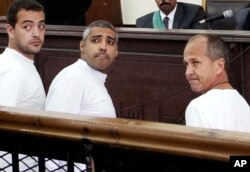The conviction and sentencing of three Al Jazeera journalists on Saturday has angered and saddened free-press advocates but left at least some Egyptians feeling it was a necessary step to make the country safer.
Outside a classroom in Cairo, Abdulrahman, an Egyptian journalist who had traveled several hours from his village to learn more advanced skills in the city, said there appears now to be little hope for the future of his profession.
“If any journalist or cameraman is accused of a crime because they are doing their jobs, it impacts press freedom,” he said. “It seems like everyone is going to jail these days.”
Earlier in the day, Al Jazeera journalists Mohamed Fahmy, who has Canadian and Egyptian nationality, and Egyptian Baher Mohamed were in court to hear their convictions for “spreading false news.” They were sentenced to three and three and one-half years in prison, respectively, and taken into custody immediately.
The men had already been tried and convicted and had each served a year in prison, but they were freed on bail in February when a retrial was ordered. A third Al Jazeera journalist, Australian reporter Peter Greste, was imprisoned with the others, but he was deported to Australia after being released on bail; he was convicted in absentia Saturday and also was sentenced to three years' imprisonment.
Al Jazeera said it intended to appeal the verdict, calling the sentences an assault on a free press.
"Today's verdict defied logic and common sense," said Mostefa Souag, acting director of Al Jazeera's media network, in a statement.
Souag said the journalists "have been sentenced despite the fact that not a shred of evidence was found to support the extraordinary and false charges against them. ... It is a dark day for the Egyptian judiciary. Rather than defend liberties and a free and fair media, they have compromised their independence for political reasons."
The convictions were "unjust" and "cannot be allowed to stand. ... We are not terrorists," said Greste, who appeared on Al Jazeera from Australia shortly after the verdicts were announced.
More condemnation
Human rights groups; government officials from the United States, Canada, Australia and Britain; and prominent journalists also condemned the verdict and called for the journalists' unconditional release.
"The freedom of the press to investigate, report and comment — even when its perspective is unpopular or disputed — is fundamental to any free society and essential to democratic development," the U.S. State Department said. "We urge the government of Egypt to take all available measures to redress this verdict, which undermines the very freedom of expression necessary for stability and development."
The verdicts "represent the total crackdown on free expression we're seeing in Egypt today," said Nicholas Piachaud, Amnesty International's Egypt researcher. The three are "prisoners of conscience again ... we had hoped international pressure brought on Egypt would have resulted in their release."
The verdict "sends a message that journalists can be locked up for simply doing their job, for telling the truth and reporting the news," said attorney Amal Clooney, who represented Fahmy. "And it sends a dangerous message that there are judges in Egypt who will allow their courts to become instruments of political repression and propaganda."
But four years of political turmoil in Egypt and the explosive growth of Islamist militant groups in the region have left many Egyptians far more concerned with security and the economy than press freedom.
On the streets of Cairo, some locals said the journalists’ convictions would help protect Egyptian people.
“They brought harm to Egypt,” said Sabri Kamel, a retiree chatting with friends outside a bookstore. “And even now, when they are in jail, there are others on the outside continuing to harm Egypt.”
'The Marriott Cell'
Prosecutors said the “false news” the three were convicted of spreading was in support of the Muslim Brotherhood, which is now considered a terrorist organization by the Egyptian government. Al Jazeera is owned by Qatar, which supports the Muslim Brotherhood.
“It has been clearly proven that the defendants are not journalists,” Judge Hassan Farid said in court Saturday. “They owned live-streaming devices without clearance. They broadcast false news on Al Jazeera, which is banned in Egypt for harming the country.”
Besides reporting for Al Jazeera's English-language broadcasts, the three journalists all have worked in the past for news organizations such as the BBC, CNN and Reuters. They and their supporters had expected they would either be acquitted or, if convicted, given sentences equal to the time they already had spent in custody.
The Al Jazeera trio had been working from quarters at the Cairo Marriott Hotel — in an "unlicensed room," as the judge noted — and the authorities' charges led to them becoming known as "the Marriott Cell," implying they were part of a terrorist organization.
Political fight
Less than two and one-half years ago, the Muslim Brotherhood was Egypt's ruling political party, and one of its leaders, Mohamed Morsi, was president.
Morsi was removed by the Egyptian military in connection with mass protests in Cairo and other cities, but his ouster triggered even wider protests, organized by the Muslim Brotherhood. In court Saturday, three freelance reporters were convicted on charges arising from their work for a pro-Brotherhood press center at Raba’a; they were accused of membership in "the Marriott cell" because they provided videos to Al Jazeera.
The network denies using its broadcasts for political purposes, but the bias in the Arabic-language shows is blatant, according to political analyst and publisher Hisham Kassem. Al Jazeera's English programs are produced by the same company but are seen as more balanced.
Regardless of any bias issues, Kassem said, the journalists' convictions were a blow to Egypt’s human rights record and its international reputation. “This is very disappointing,” he added. “I think it’s going to have grave consequences.”
In May, Fahmy filed a lawsuit in Canada against his network, accusing Al Jazeera of "epic negligence" and asking for more than $80 million in damages. Al Jazeera denied the accusations and said Egypt's government was responsible for the journalists' imprisonment.


